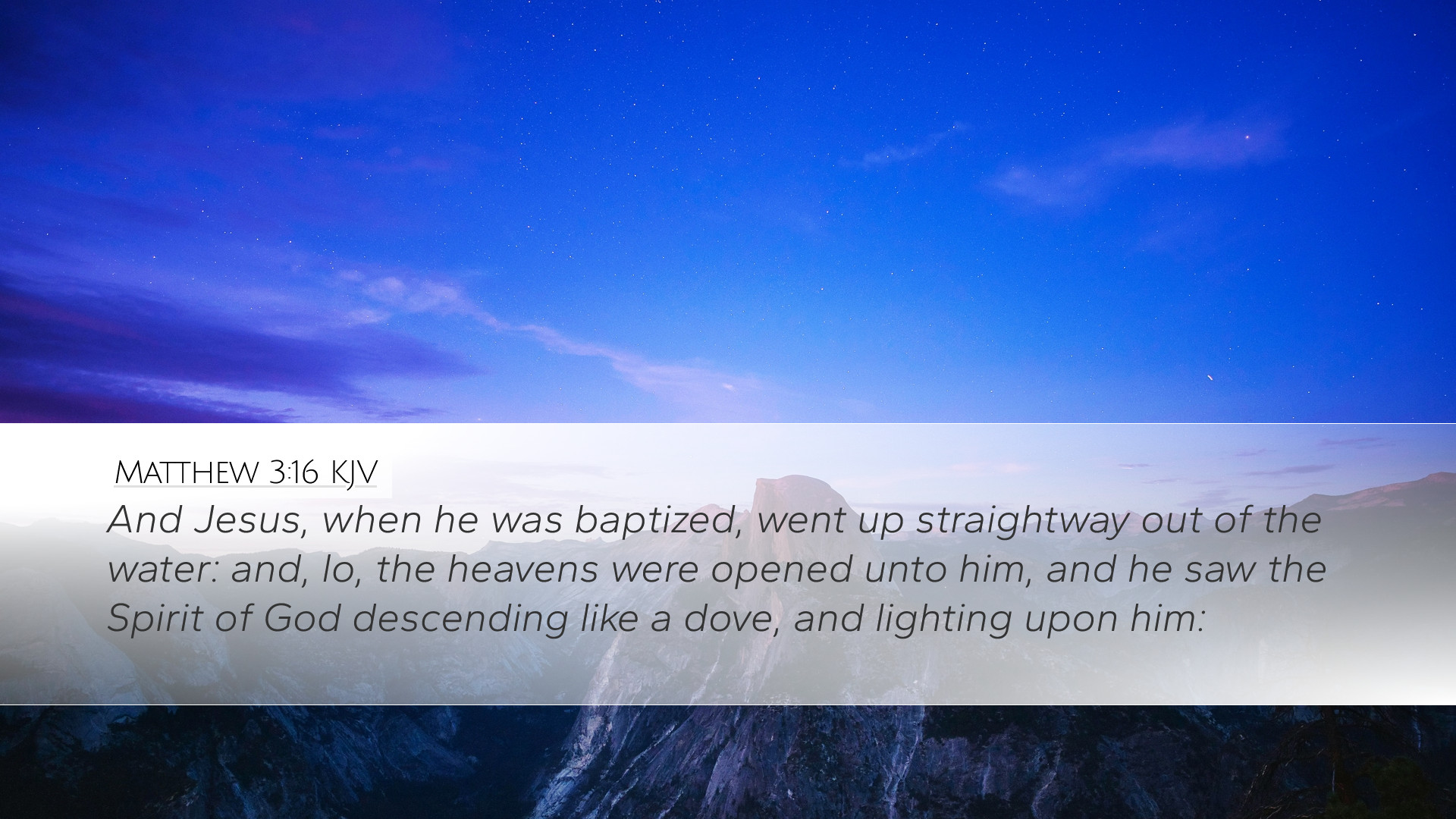Commentary on Matthew 3:16
Matthew 3:16 states, "And Jesus, when he was baptized, went up straightway out of the water: and, lo, the heavens were opened unto him, and he saw the Spirit of God descending like a dove, and lighting upon him."
Introduction
The significance of Jesus' baptism is profound and multifaceted. In this passage, we observe the initiation of Jesus' public ministry and the divine affirmation of His identity as the Son of God. This moment serves as a fulcrum for Christian theology, encapsulating themes of revelation, ordination, and the presence of the Trinity.
Insights from Matthew Henry
Matthew Henry elaborates on the importance of Christ's baptism as a public endorsement of His ministry. He notes that, unlike others who came to baptism for repentance, Jesus had no sin to confess. Henry emphasizes that His baptism was not a matter of personal necessity but rather an act of obedience to fulfill all righteousness (Matthew 3:15).
-
Identification with Humanity: Henry argues that Jesus’ baptism demonstrates His identification with sinners. By participating in this act, He embraces His role as the Savior of mankind, aligning Himself with humanity's need for repentance and salvation.
-
Heavens Opened: The opening of the heavens signifies the divine approval of Christ’s mission. Henry interprets this celestial phenomenon as God's acknowledgment of Jesus' readiness to commence His redemptive work.
Insights from Albert Barnes
Albert Barnes presents a detailed analysis of the cultural and theological context surrounding the baptism. He notes that John's baptism was a preparatory act leading to the acknowledgment of Jesus as the Messiah. Barnes highlights that the phrase "went up straightway out of the water" indicates that Jesus was immersed, which is consistent with the typical practice of baptism at the time.
-
Descent of the Spirit: Barnes points out that the Spirit of God descending like a dove signifies the anointing of Jesus for His ministry. It represents divine empowerment and the fulfillment of the prophetic expectation of the Spirit resting upon the Messiah.
-
The Vision: The vision experienced by Jesus is not merely for His benefit but serves as a profound revelation to those present. This event marks a pivotal moment in the redemptive narrative, confirming Jesus’ unique relationship with the Father.
Insights from Adam Clarke
Adam Clarke offers a theological reflection on the act of baptism itself. He argues that the event of Jesus' baptism is loaded with symbolism, establishing not only His identity but also setting a precedent for the practice of baptism in the Christian tradition. Clarke’s commentary emphasizes the significance of this act for all believers, indicating that through baptism, one publicly asserts their faith and allegiance to Christ.
-
The Dove Symbolism: Clarke notes that the dove is a creature associated with peace and purity in biblical literature. The descent of the dove symbolizes the gentleness of the Holy Spirit alongside His vital role in inaugurating Jesus’ mission.
-
Trinitarian Revelation: Clarke stresses that the baptism event reveals the Trinity: the Father’s voice from heaven, the Son in the water, and the Spirit descending. This revelation is foundational for understanding the nature of God as a triune being.
Theological Reflections
The baptism of Jesus is not merely a historical event; it serves as a theological cornerstone for understanding the nature of the gospel. It reveals the interplay between divine authority and human obedience. The act sets a transformative example for believers, illustrating the importance of public confession and demonstration of faith.
-
Emphasis on Obedience: Jesus’ insistence on being baptized serves to underscore the essential nature of obedience in the life of a believer. It establishes a template for how followers should conduct themselves in faith.
-
Divine Affirmation: The voice from heaven affirming Jesus as the beloved Son serves as a reminder of God’s acceptance and approval. This affirmation provides believers with confidence in their own identity as children of God through faith in Christ.
Practical Applications
For pastors, students, and theologians, this passage provides significant reflections that can be applied in preaching, teaching, and personal faith practices. The themes encapsulated in Matthew 3:16 offer rich material for exploration in both personal and congregational contexts.
-
Call to Baptism: The event underscores the importance of baptism as an essential step in the believer’s journey. Churches are encouraged to advocate for baptism as a catalytic experience of declaring faith.
-
Understanding the Holy Spirit: The descent of the Spirit invites deeper teaching on the essential role of the Holy Spirit in the life of a believer and the church.
-
Identity in Christ: This passage is a powerful reminder of the believer’s identity in Christ as a beloved child of God, encouraging individuals to live in a manner worthy of that calling.
Conclusion
Matthew 3:16 is a profound text that not only marks the beginning of Jesus' public ministry but also provides key theological insights relevant to the Christian faith. By drawing from the wisdom of historical commentaries, we are reminded of the richness of Scripture and the importance of baptism, both as an act of obedience and as a profound expression of faith.


